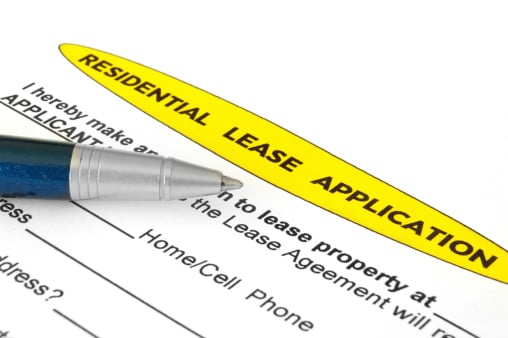As a Washington, D.C. rental property owner, you agree to lease your rental home to tenants, for an agreed upon amount of time. This lease agreement establishes the relationship between landlord and tenant and many times involves the help of a D.C. property management company. With a signed lease agreement, the tenant receives legal possession of your rental property in exchange for a monthly rent payment that is agreed upon at the time the lease agreement is signed. Lease agreements set the term limit and include any provisions necessary detailing both the landlord’s and tenant’s duties.
With a signed lease agreement, the tenant receives legal possession of your rental property in exchange for a monthly rent payment that is agreed upon at the time the lease agreement is signed. Lease agreements set the term limit and include any provisions necessary detailing both the landlord’s and tenant’s duties.
There are several types of lease agreements that you should be aware of before you hire property management in the D.C. area and start placing tenants in your investment property. Today we will take a look at the most common types of tenancy leases so that when it comes time for you or your property management company to draft yours, you will have a full understanding of everything that is included.
Types of Washington, D.C. Tenancies
There are generally four distinct tenancy types you can have structured into your D.C. rental agreement. Though typically all four remain consistent from location to location, before drafting and signing a lease agreement, it is important you check with your local jurisdiction to make sure you are not violating any local or state laws.
That being said, if you have a quality property management company on your side drafting legally compliant lease agreements, you should have no problems with the provisions included.
Before occupation of your D.C. rental property can occur, you must first initiate the right for a tenant to occupy the real estate that is your rental home. You do this by establishing a tenancy type.
Most tenancy type lease agreements have these main characteristics in common:
- An agreed upon lease term with a set termination date
- Capability of termination via proper notice
- Possibility of eviction due to non-payment or major lease agreement breaches
- Built-in responsibilities of the landlord such as providing a safe and habitable place for tenants
Let’s now take a look at the different types of tenancies available:
1. Tenancy for Years
A tenancy for years, also known as a fixed-term tenancy, specifies in a written lease agreement a definitive start point of occupation (also called the commencement date) and involves a fixed term with an agreed upon end date (also called the expiration date).
 These leases automatically terminate at the specified end date and do not require notice from either the landlord or tenant to vacate the property. If, however, the tenant wishes to extend the lease agreement another term come the expiration date, the landlord and tenant must again contractually agree and include any provision changes, such a differing monthly rent rate, for it to be enforceable.
These leases automatically terminate at the specified end date and do not require notice from either the landlord or tenant to vacate the property. If, however, the tenant wishes to extend the lease agreement another term come the expiration date, the landlord and tenant must again contractually agree and include any provision changes, such a differing monthly rent rate, for it to be enforceable.
With a fixed-term tenancy lease, your D.C. tenant has the right to occupy your rental property for the entire fixed term. so long as the pre-determined rental amount is satisfied each month and no breaches of the signed contract occur.
However, with a fixed-term tenancy, there are also some stipulations the tenant must agree to that may be considered disadvantageous. These include:
- Liability for all rent due for the entire fixed term
- Consequences for vacating the property prior to the expiration date including but not limited to rent amount due, damages caused to the landlord for early lease termination, and court costs should the matter be taken to court
- Prohibitions on subletting to cover rent obligations should an early termination of the lease agreement be unavoidable
2. Periodic Tenancy
A periodic tenancy sets an initial commencement date, though, the term continues for successive amounts of time until the lease is terminated via a notice to vacate from either party. Essentially, there is no definitive expiration date in a fixed-term tenancy.
Though typically these types of tenancies go from month-to-month, it is not unusual to sometimes see an annual rent payment indicating a year-to-year tenancy or even a week-to-week tenancy (such as in the case of a vacation rental property).
This lease type can be written or oral. In addition, before occupation of the property, arrangements are made for rent payments to be made at certain intervals of time. These payments usually coincide with the time interval set for the tenancy.
In order to terminate a periodic tenancy, prior notice must be given at least equal to the length of the period of the tenancy itself, unless you and your tenant agree to different terms for termination of the agreement.
3. Tenancy at Will
A tenancy at will can be seen as one of the most flexible tenancy types when it comes to lease agreements. For your Washington, D.C. property to have a tenancy at will in place, it would have to have the following characteristics:
- There is no contractual lease agreement in place.
- Possession of your property is given to the tenant with your knowledge and consent.
- Occupation of your property will extend for an indefinite and unspecified period of time.
- No provision of rent payment is contractual laid out.
In a nutshell, this lease agreement does not have the typical written lease agreement contracting both parties into a defined tenancy type. In addition, at any time, without any type of notice, either party can terminate the occupation of the rental property. This makes for easy rental agreement changes without the hassle of worrying about breaking a written lease agreement.
Though minimal at their best, this is not to say there are no legal protections when it comes to tenancies at will. You are still required to provide a safe and habitable place for your tenant to live. Additionally, prior notice must be given to enter the premises as governed by local statutes.
Tenants, on the other hand, are still responsible for paying the orally agreed upon monthly rent amount and adhere to the rules set in place by you, the property owner. They are also still responsible for damages beyond that of normal wear and tear.
4. Tenancy at Sufferance
 A tenancy at sufferance is not an intentionally created tenancy type and is never written into a lease agreement. Rather, this type of tenancy is when your D.C. tenant remains in your rental property after the termination of the lease agreement or when the term has automatically expired.
A tenancy at sufferance is not an intentionally created tenancy type and is never written into a lease agreement. Rather, this type of tenancy is when your D.C. tenant remains in your rental property after the termination of the lease agreement or when the term has automatically expired.
In addition, this is all before you have officially given them notice to vacate.
The element setting this type of tenant apart from a trespasser is that at one point in time your tenant legally had the right to occupy your rental property, and now they do not.
There are many situations that arise when your tenant decides to unlawfully remain in your rental property after a lease termination or expiration date has passed:
- Tenants are no longer liable for monthly rent payments since they are not lawfully allowed to be on the premises.
- Tenants lose all legal renters rights.
- There are typically holdover fines or daily rates in place for situations like this that may be awarded you in court after the tenant is evicted or vacates willfully.
- Any rent you do accept after the lease has terminated or expiration date has passed will legally be considered a periodic tenancy type that allows the holdover tenant to now occupy your property lawfully.
- You must follow your state’s legal eviction process to remove a holdover tenant to avoid any legal ramifications on your end.
Having a tenant overstay the lease agreement you set forth at the start of the lease term can be a tricky process. And, while there are specific steps that can (and should) be taken immediately if this situation arises, it is best to employ an expert property management group to manage your properties to ward off problem tenants capable of such things.
Thorough tenant screening can do wonders when it comes to placing quality tenants in your D.C. rental home. And, while there is never a guarantee that tenants will not cause you problems, having a D.C. property management company on your side to help can make your life a lot easier.
Final Thoughts
If you are unsure about what type of tenancy type you would like built into your Washington, D.C. rental property lease agreement, give Bay Management Group a call.
Dealing solely with property management, the team at Bay Management Group is knowledgeable in all lease agreement types and can help you decide which one is best suited for your individual needs. So, contact us today and see how they can help you draft the perfect lease agreement for your D.C. rental properties.
